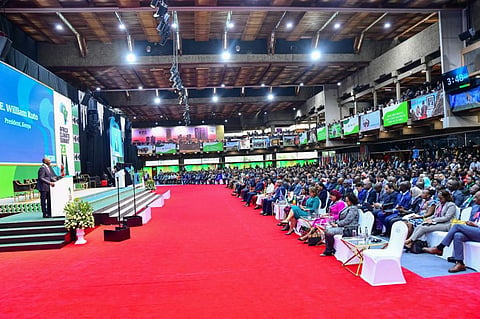

Despite having a small carbon footprint, Africa disproportionately bears the human toll of climate change, highlighting the urgent need for regional and global action, President William Ruto reminded while inaugurating the Africa Climate Summit, 2023 (ACW23) on September 4, 2023 at Nairobi, Kenya.
“Africa’s carbon footprint remains small, but the human toll of climate change is disproportionately high. The urgency to address loss and damage and to configure appropriate financial mechanisms for resilience grows with each extreme weather event,” the president said in his welcome address.
But Africa does not have the luxury of engaging in conversations around Global North vs Global South or the developed vs developing countries. It is time to take actions, because when the apocalypse happens, the entire humanity including Africa will be affected, he reminded the leaders present at the Ministerial event on first day.
President Ruto outlined the great potential of Africa’s youth, stating that by 2050, the continent will comprise over 25 per cent of the global workforce and nearly 40 per cent by 2100. The summit seeking solutions for climate change with regional and global collaborations will conclude with a Nairobi declaration, Ruto announced.
At the opening plenary session for the Ministerial Day with the theme “The Power of the Potential”, the president also emphasised that Africa’s natural resources, including its vast renewable energy potential, are a significant asset for the continent’s green growth and for the world as well.
Renewables have the potential to drive green growth — nationally and globally. The combination of renewables like wind, geothermal, solar, biomass and hydro has the potential to make Africa self-sufficient in addressing its energy needs, Ruto stated.
According to him, Africa can be the green industrial hub that helps other nations achieve their net-zero strategies by 2050. This presents an opportunity for global economic growth and environmental sustainability. These resources also offer Africa the opportunities to contribute towards decarbonising the global economy too.
It is not just the volume of renewable resources but also the non-seasonality of renewables that is unique to the continent, the president said. For example, the ideal climate for solar energy in Africa, with nearly year-round sunshine provides the continent a unique advantage
He acknowledged Kenya as a good example to demonstrate the renewable energy potential and said that in the country, 93 per cent of the national grid is already powered by renewables. But the country has an ambitious plan to achieve 100 per cent renewable energy by 2030 and 100 gigawatts national grid entirely renewable by 2040, he announced in his opening speech
But underscoring the need for finances, he urged upon the need to provide incentives to private sector in energy infrastructure development
This is essential to tackle the wide-spread energy poverty in the continent, where 600 million people currently have no access to power and almost a billion people do not have access to clean fuel for cooking.
He reminded of the geo-economic possibilities available for the continent due to its mineral resources especially the green minerals.
The continent offers resources like cobalt, nickle, lithium necessary for electric vehicles required by the world. As of now, these are available for extraction as raw materials. But the mineral resources, if supported with new technology and new climate finances, offer various possibilities for the continent.
By 2025, mining of battery critical minerals — nickle, lithium and cobalt — is estimated to generate $11 billion. Refining these minerals into industrial grade metals, the value could nearly jump to around $50 billion, stated President Ruto.
By following the right trajectory, if the end-to-end value chain for electric vehicles, including the batteries, is considered, the economic value can sky-rocket to $7 trillion.
So, he advocated for a more comprehensive, sustainable approach that moves beyond reliance on raw materials. In fact, countries such as Ghana, Zimbabwe and Namibia have green minerals policy to derive as much benefit as possible from its mineral resources.
Besides stressing on investments in renewable energy and green industrialisation, President Ruto also underlined the growing significance of climate-smart agriculture, and nature conservation for achieving sustainable, climate-resilient development in Africa and the world.
The five-day event is being held under the theme ’Driving Green Growth and Climate Finance Solutions for Africa and the World’.
The outcomes of the summit are critical for the African continent to arrive at a consensus and mobilise action in the lead-up to the upcoming 28th Conference of Parties (COP28) to the United Nations Framework Convention on Climate Change to be hosted in Dubai, United Arab Emirates.